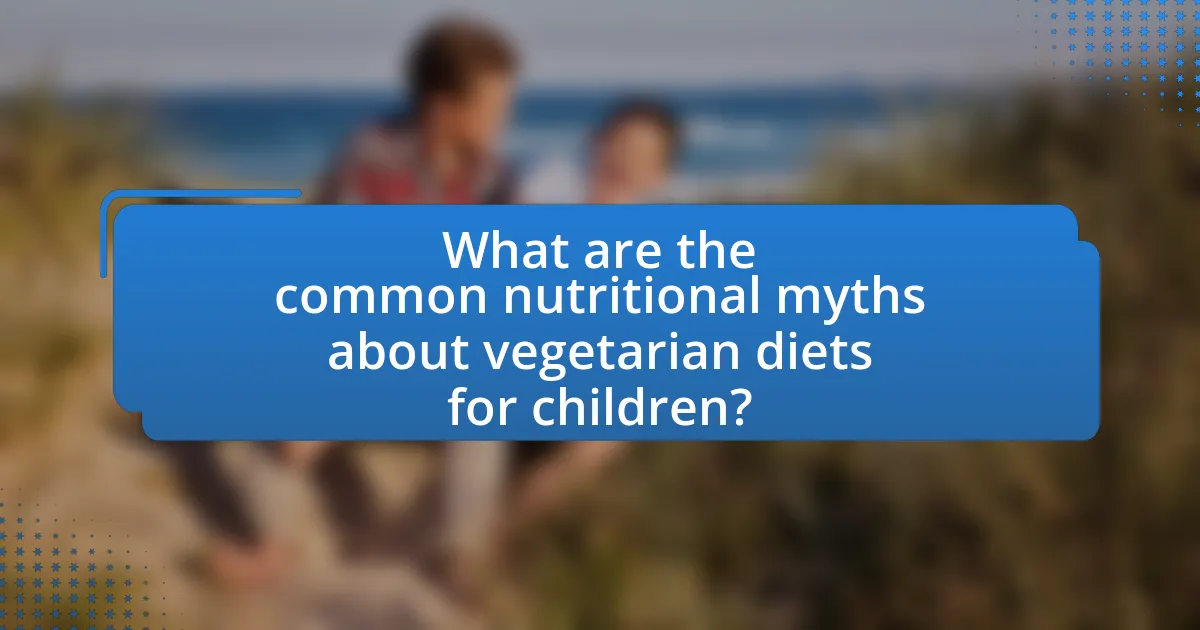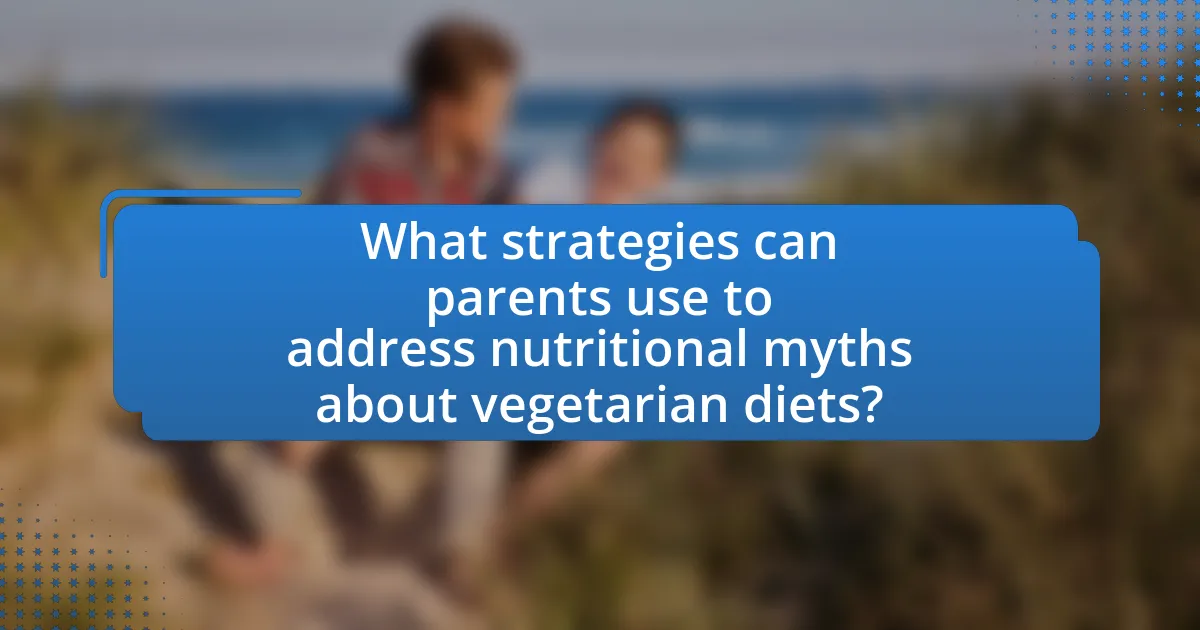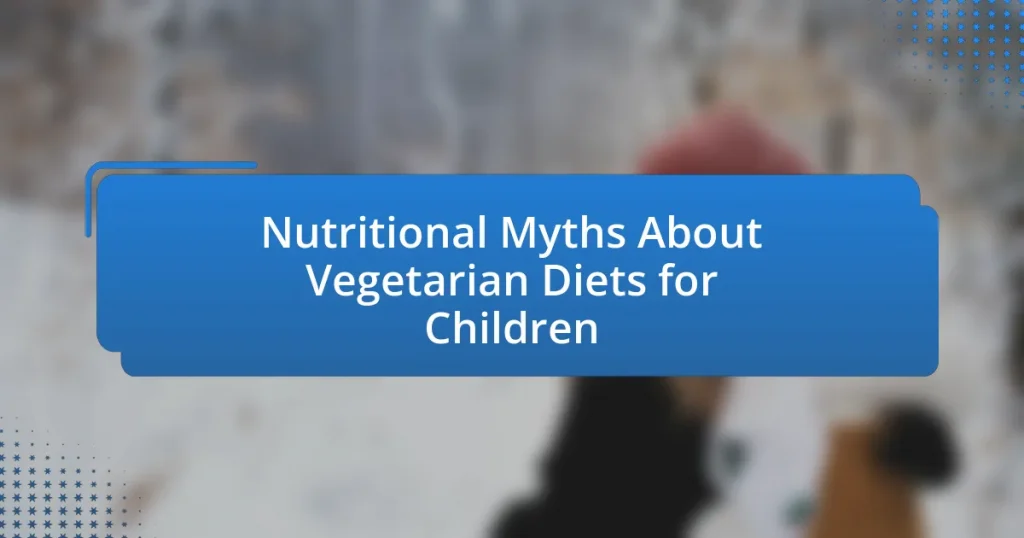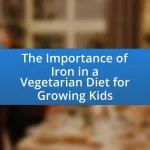The article addresses common nutritional myths surrounding vegetarian diets for children, highlighting misconceptions about protein, iron, calcium, and essential nutrients. It explains how misinformation and cultural beliefs contribute to these myths, despite research indicating that well-planned vegetarian diets can support healthy growth and development. The article also outlines the nutritional needs of children, the best plant-based protein sources, and strategies for parents to ensure their children receive adequate nutrition while debunking prevalent myths. Additionally, it emphasizes the importance of proper meal planning and education to promote healthy eating habits in vegetarian children.

What are the common nutritional myths about vegetarian diets for children?
Common nutritional myths about vegetarian diets for children include the belief that these diets lack sufficient protein, iron, and essential nutrients. Many assume that vegetarian diets cannot provide adequate protein; however, plant-based sources such as legumes, nuts, and whole grains can meet protein needs effectively. Another myth is that vegetarian diets are deficient in iron, but iron from plant sources, like lentils and spinach, can be absorbed efficiently when consumed with vitamin C-rich foods. Additionally, there is a misconception that children on vegetarian diets do not get enough calcium; yet, fortified plant milks and leafy greens can provide ample calcium. These myths are often debunked by nutritional studies indicating that well-planned vegetarian diets can support healthy growth and development in children.
Why do these myths persist in society?
Nutritional myths about vegetarian diets for children persist in society primarily due to misinformation and cultural beliefs. Many individuals rely on outdated or anecdotal evidence rather than scientific research, leading to misconceptions about the nutritional adequacy of vegetarian diets for children. For instance, studies have shown that well-planned vegetarian diets can provide all necessary nutrients for children, yet myths about protein deficiency and inadequate iron intake continue to circulate. Additionally, societal norms and media portrayals often reinforce these myths, making it challenging for accurate information to gain traction.
What role does misinformation play in shaping perceptions?
Misinformation significantly influences perceptions by creating misconceptions about vegetarian diets for children. For instance, false claims that vegetarian diets lack essential nutrients can lead parents to believe that such diets are harmful, despite research indicating that well-planned vegetarian diets can provide all necessary nutrients for children. A study published in the Journal of the American Dietetic Association found that vegetarian children often have similar or better growth and health outcomes compared to their meat-eating peers when their diets are properly managed. This demonstrates that misinformation can skew public understanding and acceptance of vegetarian diets, impacting dietary choices and health outcomes for children.
How do cultural beliefs influence these myths?
Cultural beliefs significantly influence myths about vegetarian diets for children by shaping perceptions of nutrition and health. For instance, in cultures that prioritize meat consumption, there is often a belief that a diet lacking animal products is inherently deficient, leading to myths that vegetarian diets cannot provide adequate protein or essential nutrients for growing children. Research indicates that these beliefs can stem from historical dietary practices and societal norms, which emphasize meat as a primary source of strength and vitality. Additionally, cultural narratives around food can perpetuate misconceptions, such as the idea that vegetarian diets are only suitable for adults or that they may hinder a child’s growth and development. These myths can be countered by evidence showing that well-planned vegetarian diets can meet all nutritional needs for children, as supported by organizations like the American Dietetic Association, which states that appropriately planned vegetarian diets are healthful and nutritionally adequate for all stages of life.
What are the most prevalent myths regarding protein intake?
The most prevalent myths regarding protein intake include the belief that high protein consumption is necessary for muscle gain, that plant-based proteins are inferior to animal proteins, and that excessive protein intake is harmful to kidney health. Research indicates that while protein is essential for muscle repair and growth, the body requires only a moderate amount, typically around 0.8 grams per kilogram of body weight for most adults. Additionally, studies show that plant-based proteins can provide all essential amino acids when consumed in a varied diet, debunking the myth of their inferiority. Furthermore, the notion that high protein intake damages kidneys is unfounded; a study published in the Journal of the American Society of Nephrology found no adverse effects in healthy individuals consuming high protein diets.
How much protein do children actually need?
Children need approximately 0.95 grams of protein per kilogram of body weight per day. This requirement varies slightly by age; for instance, toddlers aged 1-3 years need about 13 grams of protein daily, while children aged 4-8 years require around 19 grams. These protein needs are based on recommendations from the Dietary Reference Intakes established by the National Academies of Sciences, Engineering, and Medicine, which emphasize the importance of protein for growth, development, and overall health in children.
What are the best plant-based sources of protein for children?
The best plant-based sources of protein for children include lentils, chickpeas, quinoa, tofu, and edamame. Lentils provide approximately 18 grams of protein per cooked cup, while chickpeas offer about 15 grams per cooked cup. Quinoa is a complete protein, containing all nine essential amino acids, with around 8 grams of protein per cooked cup. Tofu, made from soybeans, contains about 20 grams of protein per cup, and edamame provides roughly 17 grams of protein per cooked cup. These sources are not only rich in protein but also offer essential nutrients that support children’s growth and development.
Are vegetarian diets lacking in essential nutrients?
Vegetarian diets can lack essential nutrients if not properly planned. Key nutrients such as vitamin B12, iron, calcium, omega-3 fatty acids, and protein may be insufficient in a vegetarian diet. For instance, a study published in the Journal of the American Dietetic Association indicates that vegetarians often have lower levels of vitamin B12, which is primarily found in animal products. Additionally, iron from plant sources is less bioavailable than that from meat, potentially leading to deficiencies if not complemented with vitamin C-rich foods to enhance absorption. Therefore, while vegetarian diets can be healthy, they require careful planning to ensure all essential nutrients are adequately obtained.
What vitamins and minerals are often considered deficient in vegetarian diets?
Vitamins and minerals often considered deficient in vegetarian diets include vitamin B12, iron, calcium, zinc, and omega-3 fatty acids. Vitamin B12 is primarily found in animal products, making it a critical nutrient for vegetarians, as deficiency can lead to anemia and neurological issues. Iron, while present in plant foods, is less bioavailable than heme iron from meat, potentially leading to lower iron levels. Calcium is essential for bone health, and vegetarians may not consume enough dairy or fortified alternatives. Zinc, important for immune function, is also less bioavailable in plant sources. Lastly, omega-3 fatty acids, particularly EPA and DHA, are primarily found in fish, and vegetarians may need to rely on flaxseeds or algae supplements to meet their needs.
How can parents ensure their children receive adequate nutrition on a vegetarian diet?
Parents can ensure their children receive adequate nutrition on a vegetarian diet by carefully planning meals that include a variety of foods rich in essential nutrients. This includes incorporating sources of protein such as legumes, tofu, and dairy products, as well as ensuring adequate intake of iron from beans, lentils, and fortified cereals. Additionally, parents should include vitamin B12 sources like dairy and fortified plant-based milks, and ensure children consume sufficient omega-3 fatty acids from flaxseeds, chia seeds, or walnuts. Research indicates that a well-planned vegetarian diet can meet the nutritional needs of children, as supported by the American Dietetic Association, which states that appropriately planned vegetarian diets are healthful and nutritionally adequate for all stages of life.
How do vegetarian diets impact children’s health and development?
Vegetarian diets can positively impact children’s health and development when properly planned. Research indicates that well-balanced vegetarian diets provide essential nutrients, promote healthy growth, and reduce the risk of chronic diseases. For instance, a study published in the Journal of the American Dietetic Association found that vegetarian children often have lower body mass indexes and better cholesterol levels compared to their non-vegetarian peers. Additionally, vegetarian diets rich in fruits, vegetables, whole grains, and legumes can enhance cognitive function and support immune health due to their high antioxidant and nutrient content.
What are the potential health benefits of a vegetarian diet for children?
A vegetarian diet for children can provide numerous health benefits, including improved nutrient intake, better weight management, and reduced risk of chronic diseases. Research indicates that vegetarian diets are often rich in fruits, vegetables, whole grains, and legumes, which contribute to higher fiber intake and lower saturated fat consumption. A study published in the Journal of the American Dietetic Association found that children following vegetarian diets typically have lower body mass indexes (BMIs) and a reduced risk of obesity-related conditions. Additionally, vegetarian diets are associated with lower cholesterol levels and a decreased risk of heart disease later in life, as noted by the American Heart Association. These benefits highlight the potential of vegetarian diets to support healthy growth and development in children.
How can a vegetarian diet support healthy growth and development?
A vegetarian diet can support healthy growth and development by providing essential nutrients such as protein, iron, calcium, and vitamins that are crucial for children’s physical and cognitive development. Research indicates that well-planned vegetarian diets can meet the nutritional needs of children, as they can obtain adequate protein from sources like legumes, nuts, and whole grains. Additionally, iron from plant sources, when consumed with vitamin C-rich foods, enhances absorption, supporting healthy blood and energy levels. A study published in the Journal of the American Dietetic Association found that vegetarian children had similar growth patterns to their non-vegetarian peers when their diets were appropriately balanced. This evidence demonstrates that a vegetarian diet, when well-structured, can effectively support the growth and developmental needs of children.
What role do vegetarian diets play in preventing childhood obesity?
Vegetarian diets play a significant role in preventing childhood obesity by promoting lower calorie intake and higher consumption of nutrient-dense foods. Research indicates that children following vegetarian diets tend to have lower body mass indexes (BMIs) compared to their non-vegetarian peers, primarily due to the emphasis on fruits, vegetables, whole grains, and legumes, which are high in fiber and low in saturated fats. A study published in the Journal of the American Dietetic Association found that vegetarian children had a 20% lower risk of being overweight than those consuming meat-based diets. This evidence supports the effectiveness of vegetarian diets in reducing the likelihood of childhood obesity.
What are the risks associated with poorly planned vegetarian diets?
Poorly planned vegetarian diets can lead to nutritional deficiencies, particularly in protein, iron, calcium, vitamin B12, and omega-3 fatty acids. These deficiencies can result in anemia, weakened immune function, and impaired growth and development in children. For instance, a study published in the Journal of the American Dietetic Association found that vegetarian children are at a higher risk of iron deficiency anemia due to lower dietary iron intake compared to their omnivorous peers. Additionally, inadequate protein intake can hinder muscle development and overall health. Therefore, careful planning is essential to ensure that a vegetarian diet meets all nutritional needs, especially for growing children.
What nutritional deficiencies should parents be aware of?
Parents should be aware of potential nutritional deficiencies in children following vegetarian diets, particularly in protein, iron, vitamin B12, calcium, and omega-3 fatty acids. Protein is essential for growth and development, and vegetarian sources may not provide all essential amino acids. Iron deficiency can lead to anemia, as plant-based iron (non-heme) is less readily absorbed than heme iron from animal sources. Vitamin B12, primarily found in animal products, is crucial for neurological function and red blood cell formation; deficiency can lead to serious health issues. Calcium is vital for bone health, and vegetarian diets may lack sufficient dairy or fortified alternatives. Lastly, omega-3 fatty acids, important for brain development, are predominantly found in fish, making it necessary for vegetarian children to seek alternative sources like flaxseeds or walnuts.
How can parents identify signs of nutritional deficiencies in their children?
Parents can identify signs of nutritional deficiencies in their children by observing physical symptoms, behavioral changes, and growth patterns. Common physical signs include pale skin, brittle hair, and dental issues, which may indicate deficiencies in iron, vitamins, or minerals. Behavioral changes such as fatigue, irritability, or difficulty concentrating can also signal inadequate nutrient intake. Additionally, stunted growth or delayed development may suggest a lack of essential nutrients. Research indicates that children on vegetarian diets may be at risk for deficiencies in vitamin B12, iron, and omega-3 fatty acids, emphasizing the importance of monitoring these signs closely.

What strategies can parents use to address nutritional myths about vegetarian diets?
Parents can address nutritional myths about vegetarian diets by providing accurate information, engaging in open discussions, and utilizing credible resources. Educating themselves about the nutritional adequacy of vegetarian diets helps parents counter common misconceptions, such as the belief that vegetarian diets lack protein or essential nutrients. For instance, research indicates that well-planned vegetarian diets can meet the nutritional needs of children, as supported by the American Dietetic Association, which states that appropriately planned vegetarian diets are healthful and nutritionally adequate. Additionally, parents can encourage children to explore diverse plant-based foods, emphasizing the importance of variety to ensure balanced nutrition. By fostering an environment of inquiry and understanding, parents can effectively dispel myths and promote healthy eating habits.
How can parents educate themselves and their children about vegetarian nutrition?
Parents can educate themselves and their children about vegetarian nutrition by utilizing credible resources such as books, online courses, and workshops focused on plant-based diets. Research indicates that a well-planned vegetarian diet can provide all necessary nutrients for children, as supported by the American Dietetic Association, which states that appropriately planned vegetarian diets are healthful and nutritionally adequate. Parents can also engage in cooking classes that emphasize vegetarian meals, encouraging hands-on learning about nutrition. Additionally, discussing the benefits of vegetarianism, such as improved health outcomes and environmental sustainability, can foster a deeper understanding among children.
What resources are available for parents seeking accurate information?
Parents seeking accurate information about vegetarian diets for children can access resources such as the Academy of Nutrition and Dietetics, which provides evidence-based guidelines and articles on vegetarian nutrition. Additionally, the American Academy of Pediatrics offers publications that address dietary needs and concerns for children following vegetarian diets. These organizations are reputable and rely on scientific research to support their recommendations, ensuring that parents receive reliable and accurate information.
How can parents involve children in meal planning to promote healthy eating habits?
Parents can involve children in meal planning by encouraging them to select recipes, shop for ingredients, and prepare meals together. This hands-on approach fosters a sense of ownership and interest in food choices, which can lead to healthier eating habits. Research indicates that children who participate in meal preparation are more likely to try new foods and develop a preference for healthier options, as noted in a study published in the Journal of Nutrition Education and Behavior. Engaging children in these activities not only enhances their understanding of nutrition but also strengthens family bonds through shared experiences.
What practical tips can help parents navigate vegetarian diets for their children?
To help parents navigate vegetarian diets for their children, it is essential to ensure a balanced intake of nutrients. Parents should focus on incorporating a variety of plant-based proteins, such as lentils, beans, tofu, and quinoa, to meet protein needs. Additionally, including a wide range of fruits and vegetables can provide necessary vitamins and minerals.
Parents should also pay attention to iron sources, such as spinach and fortified cereals, and pair them with vitamin C-rich foods like oranges or bell peppers to enhance absorption. Omega-3 fatty acids can be obtained from flaxseeds and walnuts, while calcium can be sourced from fortified plant milks and leafy greens.
Regularly consulting with a pediatrician or a registered dietitian can provide tailored guidance and ensure that children’s dietary needs are being met effectively. Research indicates that well-planned vegetarian diets can support healthy growth and development in children when properly managed.
How can parents ensure balanced meals that meet nutritional needs?
Parents can ensure balanced meals that meet nutritional needs by incorporating a variety of food groups, including fruits, vegetables, whole grains, protein sources, and healthy fats. This approach aligns with dietary guidelines that recommend a diverse diet to provide essential nutrients. For instance, the USDA’s MyPlate model emphasizes the importance of filling half the plate with fruits and vegetables, one-quarter with grains, and one-quarter with protein, ensuring a comprehensive intake of vitamins, minerals, and macronutrients necessary for children’s growth and development.
What are some easy vegetarian recipes that children will enjoy?
Easy vegetarian recipes that children will enjoy include vegetable quesadillas, pasta primavera, and homemade veggie burgers. Vegetable quesadillas can be made by filling tortillas with cheese and assorted vegetables like bell peppers and spinach, then grilling until crispy. Pasta primavera involves cooking pasta and tossing it with a variety of colorful vegetables such as carrots, peas, and zucchini, often finished with a light olive oil or tomato sauce. Homemade veggie burgers can be created using black beans, oats, and spices, formed into patties and grilled or baked. These recipes are not only simple to prepare but also appealing to children’s tastes, making them a great choice for family meals.


